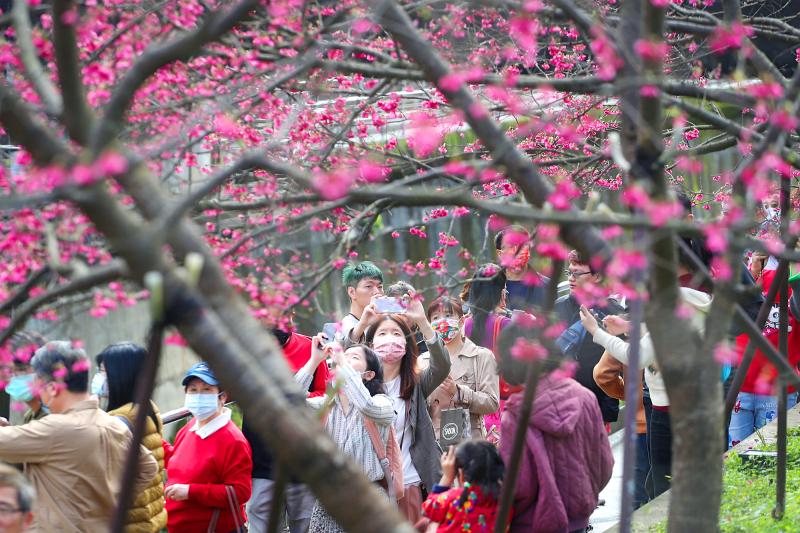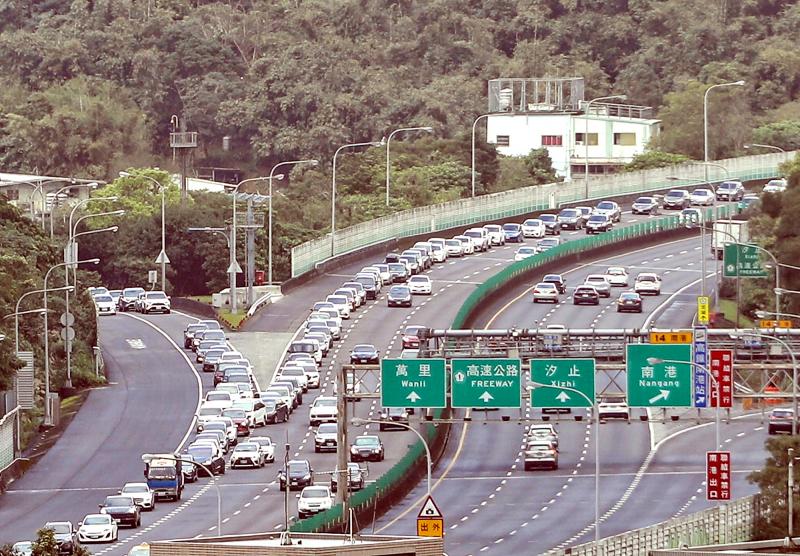Traffic was congested along the nation’s major freeways yesterday morning as people embarked on trips for the Lunar New Year holiday.
Vehicles began packing the southbound lanes of freeways at 8am, the National Freeway Bureau said.
Congestion was reported along Sun Yat-sen Freeway’s (Freeway No. 1) southbound sections between Hsinchu County’s Hukou Township (湖口) and Hsinchu, and between Yuanlin (員林) and Puyan (埔鹽) interchanges, it said.

Photo: CNA
Southbound lanes between Hemei (和美) and Mingjian (名間) on the Formosa Freeway (Freeway No. 3), as well as Freeway No. 10’s Yanchao (燕巢) interchange also reported heavy traffic, the bureau said.
Southbound lanes on the Chiang Wei-shui Memorial Freeway’s (Freeway No. 5) Shiding (石碇) and Pinglin (坪林) interchanges were also congested, it said.
The bureau urged the public to use its real-time traffic condition Web site or mobile application to check their route and destination, or tune in to the Police Broadcasting Service when on the road to avoid congested areas.

Photo: CNA
People should use public transportation when possible and, if not, ensure that their vehicles are in good condition before embarking on a trip, the bureau said.
People can report mechanical failures or accidents via the 1968 mobile application, which would tag the location of the incident so the nearest highway police station can dispatch officers, it said.
People should avoid highways when traveling short distances and utilize alternative routes, the bureau said, adding that drivers intending to drive long hours, either northbound or southbound, should use either National Freeway No. 3 or the West Coast Expressway.
In other news, as yesterday was the first day of the Lunar New Year, many people followed the custom of zouchun (“spring walk,” 走春), taking a walk to make courtesy calls to relatives and friends, or visit temples and scenic places.
Former Central Weather Bureau Weather Forecast Center director Daniel Wu (吳德榮) said there would be no rain in northern Taiwan on Monday and Tuesday, but the skies would remain overcast.
Meanwhile, central and southern areas would experience mostly overcast skies with partial sun, he added.
Wu is now an adjunct associate professor of atmospheric sciences at National Central University.
A new cold front is expected to hit Taiwan on Wednesday and last through Friday, bringing wet and chilly weather to northern Taiwan, although rain is not expected after Wednesday, he said.
The front could turn into a continental air mass, Wu said, urging the public to monitor weather reports.

A Chinese aircraft carrier group entered Japan’s economic waters over the weekend, before exiting to conduct drills involving fighter jets, the Japanese Ministry of Defense said yesterday. The Liaoning aircraft carrier, two missile destroyers and one fast combat supply ship sailed about 300km southwest of Japan’s easternmost island of Minamitori on Saturday, a ministry statement said. It was the first time a Chinese aircraft carrier had entered that part of Japan’s exclusive economic zone (EEZ), a ministry spokesman said. “We think the Chinese military is trying to improve its operational capability and ability to conduct operations in distant areas,” the spokesman said. China’s growing

Nine retired generals from Taiwan, Japan and the US have been invited to participate in a tabletop exercise hosted by the Taipei School of Economics and Political Science Foundation tomorrow and Wednesday that simulates a potential Chinese invasion of Taiwan in 2030, the foundation said yesterday. The five retired Taiwanese generals would include retired admiral Lee Hsi-min (李喜明), joined by retired US Navy admiral Michael Mullen and former chief of staff of the Japan Self-Defense Forces general Shigeru Iwasaki, it said. The simulation aims to offer strategic insights into regional security and peace in the Taiwan Strait, it added. Foundation chair Huang Huang-hsiung

PUBLIC WARNING: The two students had been tricked into going to Hong Kong for a ‘high-paying’ job, which sent them to a scam center in Cambodia Police warned the public not to trust job advertisements touting high pay abroad following the return of two college students over the weekend who had been trafficked and forced to work at a cyberscam center in Cambodia. The two victims, surnamed Lee (李), 18, and Lin (林), 19, were interviewed by police after landing in Taiwan on Saturday. Taichung’s Chingshui Police Precinct said in a statement yesterday that the two students are good friends, and Lin had suspended her studies after seeing the ad promising good pay to work in Hong Kong. Lee’s grandfather on Thursday reported to police that Lee had sent

A Chinese ship ran aground in stormy weather in shallow waters off a Philippines-controlled island in the disputed South China Sea, prompting Filipino forces to go on alert, Philippine military officials said yesterday. When Philippine forces assessed that the Chinese fishing vessel appeared to have run aground in the shallows east of Thitu Island (Jhongye Island, 中業島) on Saturday due to bad weather, Philippine military and coast guard personnel deployed to provide help, but later saw that the ship had been extricated, Philippine navy regional spokesperson Ellaine Rose Collado said. No other details were immediately available, including if there were injuries among